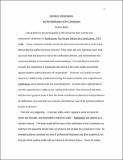Narrative, Interpretation, and the Ratification of the Constitution
Author(s)
Maier, Pauline
DownloadForum Response PM-1.pdf (91.31Kb)
OPEN_ACCESS_POLICY
Open Access Policy
Creative Commons Attribution-Noncommercial-Share Alike
Terms of use
Metadata
Show full item recordAbstract
I am grateful to the participants in this forum for their careful and enthusiastic responses to Ratification: The People Debate the Constitution, 1787-1788. Some comments usefully extend the discussion beyond what’s in the book . Maeva Marcus pushes the story into the 1790s, when the new Supreme Court took up issues that had played a role in the ratification debates, and demonstrates the continued fluidity of constitutional understandings. For both Marcus and Seth Cornell, the complexity of arguments described in the book weighs powerfully against modern judicial theories of “originalism.” However, as Cornell correctly observes, I deliberately avoided discussing the modern debate over originalism in Ratification, and I intend to do the same thing here. It seems more appropriate to use this opportunity to address the “authorial decisions” that interest Todd Estes and the more general issue of how the book contributes to historical interpretations of ratification, an event that one reviewer described as “one of the greatest political brawls of all time.”i
Date issued
2012-04Department
Massachusetts Institute of Technology. School of Humanities, Arts, and Social SciencesJournal
William and Mary Quarterly
Publisher
Omohundro Institute of Early American History and Culture
Citation
“Narrative, Interpretation, and the Ratification of the Constitution.” The William and Mary Quarterly 69.2 (2012): 382-390.
Version: Original manuscript
ISSN
0043-5597
1933-7698